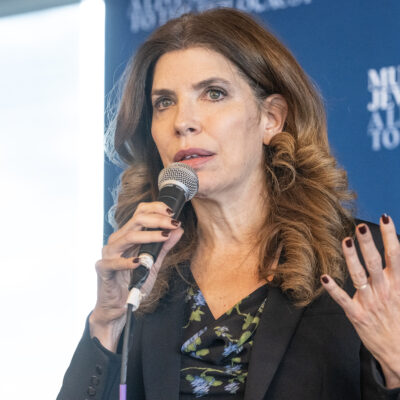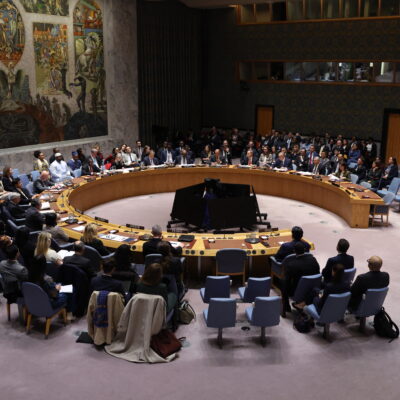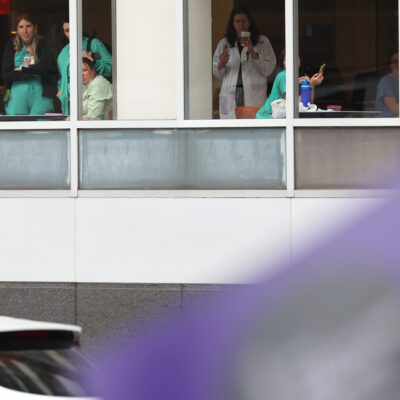
(Courtesy)
Sandlers, simchas and sisterhood
Sammi Cohen, director of ‘You Are So Not Invited To My Bat Mitzvah,’ discusses the making of the Jewish-centric film and the universality of growing up
Growing up can be an exciting, awkward and often incredibly trying time no matter who you are: puberty, first crushes and a lack of self-understanding all add to the journey that is adolescence. For Jewish children, that milestone comes with Torah portions and Bible study, deejay-prompted slow dances, Coke and Pepsi and plenty of drama — an experience director Sammi Cohen looked to capture with their new movie, “You Are So Not Invited To My Bat Mitzvah,” which premieres Friday on Netflix.
“When I first read the script, I was just like, ‘A bat mitzvah movie, finally!” like, ‘Finally, why has this taken so long?’” Cohen told Jewish Insider last week. “What was fun is it felt so personal to being a Jewish kid and this very specific moment in life, but it also felt so universal.”
The film centers around Stacy Friedman (played by Adam Sandler’s daughter, Sunny, in her first major starring role) and best friend Lydia Rodriguez Katz as they prepare for their upcoming bat mitzvahs; when jealousy and the affection of the middle school soccer star come between the two girls, their plans to have the best bat mitzvah parties of their class start to fall apart.
“We put a lot of weight on romantic relationships, even in coming-of-age stories, and I think I was excited outside of the Judaism too that this is about two best friends. It’s a platonic love story between these two best friends, and I think the idea of friendship and forgiveness and learning about who you are is also so relevant to these relationships,” Cohen said. “Friends teach us who we are.”
Also central to the story is Stacy’s family, played by Idina Menzel, Adam Sandler and Sandler’s eldest daughter Sadie. Jackie Sandler, who has been married to her comedian husband since 2003, plays Lydia’s mom, Gabi, who’s going through a tough divorce.

“You Are So Not Invited” is the latest in a series of movies to come out this summer featuring or inspired by Jewish individuals. Late April saw “Are You There, God? It’s Me, Margaret,” a film based on the beloved novel of the same name by Jewish author Judy Blume, followed in July by two blockbusters — “Oppenheimer,” about the Jewish physicist behind the atomic bomb, and Greta Gerwig’s “Barbie,” a film based on the wildly popular doll created by Jewish businesswoman Ruth Handler. On Friday, the same day “You Are So Not Invited” starts streaming on Netflix, director Guy Nattiv’s Golda Meir biopic hits theaters.
“It’s kind of time,” Cohen said. “A lot of the movies about being Jewish I think, necessarily so, are about a really dark time in our history, and I think what’s really fun is I’m excited to make a movie that makes Jewish people feel seen and celebrated.”
To Cohen, “You Are So Not Invited” is a way for audiences to get a real look into Judaism; the fun, goofy and cool aspects of living as a Jewish person that aren’t typically displayed on screen.
“There’s a lot of care and dedication that goes into the prepping for the bat mitzvah, and there’s this serious side to us, but being Jewish is, you know, it’s family, it’s community, it’s coming together and like eating food and dancing, and it’s so beautifully, wonderfully Jewish,” Cohen said. “It’s exciting for the world to get to see us like, we can throw a party, we can have fun. You know, we also take things seriously but like, we’re fun and we’re cool.”
Most of the cast and a large number of the film’s crew are Jewish — comedian Sarah Sherman plays the family’s rabbi, and Stacy’s Hebrew school teacher, Rabbi Rebecca, while musician Este Haim, one third of the pop-rock trio Haim, scored the film — a choice Cohen said was intentional.
“It’s kind of time,” Cohen said. “A lot of the movies about being Jewish I think, necessarily so, are about a really dark time in our history, and I think what’s really fun is I’m excited to make a movie that makes Jewish people feel seen and celebrated.”
“There’s a level of authenticity that is hopefully coming across in watching the film, and I think that’s really a testament to the people involved,” Cohen said. “At the end of the day, it’s always who’s best for the job, but even with Este, like, it really made sense.”
“Everyone got to bring themselves to their roles,” Cohen added.
Despite centering on a specifically Jewish ritual, Cohen stressed the film’s universality. Growing up, making mistakes and learning about oneself are all fundamental Jewish experiences, Cohen said, but they also resonate with everyone.
“My hope is really that people start to embrace our differences by celebrating those similarities,” Cohen added. “I want people to learn about being Jewish and be like, ‘Oh, hey, we have someone like that,’ ‘Oh, that’s cool, being Jewish sounds fun.’”
“For the Jewish kids, the specificity of the world makes us feel seen and feels authentic, but there’s so much to relate to,” they added.
Outside of the two friends, Cohen sees the Friedman family as “the heart of this movie,” a family whose portrayal will likely ring true with many Jews. For Cohen, who grew up Reform in the suburban Los Angeles neighborhood of Woodland Hills, there are moments of nostalgia throughout the film.
“I grew up celebrating the High Holidays, going to temple, when I was old enough I went on Birthright, like, tonight I’m going to Shabbat with my community here in L.A.,” Cohen said. “I think there’s some aspects of the bat mitzvah that have not changed at all, which is really fun.”
In the same vein, however, as a progressive, queer, nonbinary person who wasn’t out at the time, there were also moments of Cohen’s childhood where they didn’t always feel like they “necessarily fit into every facet of [Judaism].” For that reason, they were excited to add some of those missing pieces into “You Are So Not Invited.”
“The first party [Stacy and Lydia] go to is actually a b’nai mitzvah for a nonbinary kid,” Cohen said. “It’s not anything we harp on, you probably won’t even notice it, but I was kind of excited to go, ‘Ooh, if I was making this for me as a kid, what are the little details I’d add?’ and that was one of them.”
Diversity and inclusivity are continuous themes throughout the film, a change from the eponymous 2001 novel by Fiona Rosenbloom that the film is based on. Otherwise, Cohen says, “the heart of the book lends itself to the heart of the film.”
“The movie is a more progressive and modern telling of the 2001 source material it’s based on,” Cohen said. “I think the movie is a little more inclusive, queer, body positive, progressive when it comes to social issues and family dynamics and gender, but the heart of the movie, and Stacey, is [true to the original].”
Working with the Sandlers was a “dream come true” for Cohen, who quickly felt like “part of the family.”
“That’s what they do, in general. They’re just warm, very hard-working, very dedicated, passionate, but also just really take a lot of care in taking care of people.” Cohen said. “I learned from [Adam] Sandler — it’s not about making movies, it’s about making movies with people you love and trust.”
The Sandlers were always set to star together — in addition to his leading role, Adam Sandler produced the film, alongside his production company, Happy Madison Productions — which created a natural chemistry on set. But the film mirrored life in more ways than one. Right before production began, Sunny celebrated her actual bat mitzvah, a personal detail of which actually made it into the film.
“When [Sunny’s] done reading her Torah portion in the movie, she goes, ‘I did it!’ Like she just, to herself without thinking she goes, ‘I did it!’” Cohen recalled. “She did that, it was so charming, at the actual service, like she did that in real life, and it almost made me cry, because I don’t even know if she remembered saying it, but she just said it, and it was this thing that I think we all relate to. Like when you’ve worked so hard to do something and you get through it and you’re done, it was this vocalized, internal feeling that I’ve had in the past, so I went that is so sweet and real, and so we did that in the movie too.”
None of the Sandlers, nor the rest of the film’s cast, have been able to promote the project due to the ongoing SAG-AFTRA strike, but Cohen is still excited to be able to share the film with audiences.
“I’m a director, and I absolutely love what I do more than anything else, but I’m nothing without my writers, without the actors, without the hundreds of people working on this movie,” Cohen said. “I am just one small part of this very big puzzle, and so I really hope that the strike ends and that the actors and the writers get what they deserve so we can get back to work, because I love work.”

“But the movie itself, you know, I wish we could all be out talking about the movie, but we luckily still get to see this thing come out in a week,” they added.
The entire movie is a lesson on forgiveness and learning to grow into one’s true self, struggles that any audience can understand.
“I love that there’s this idea of like, we all make mistakes. It’s about the choices you make to correct those mistakes that really matter,” Cohen said. “This idea of a mitzvah being so specifically Jewish, but also good deeds, that’s just like a human thing.”






